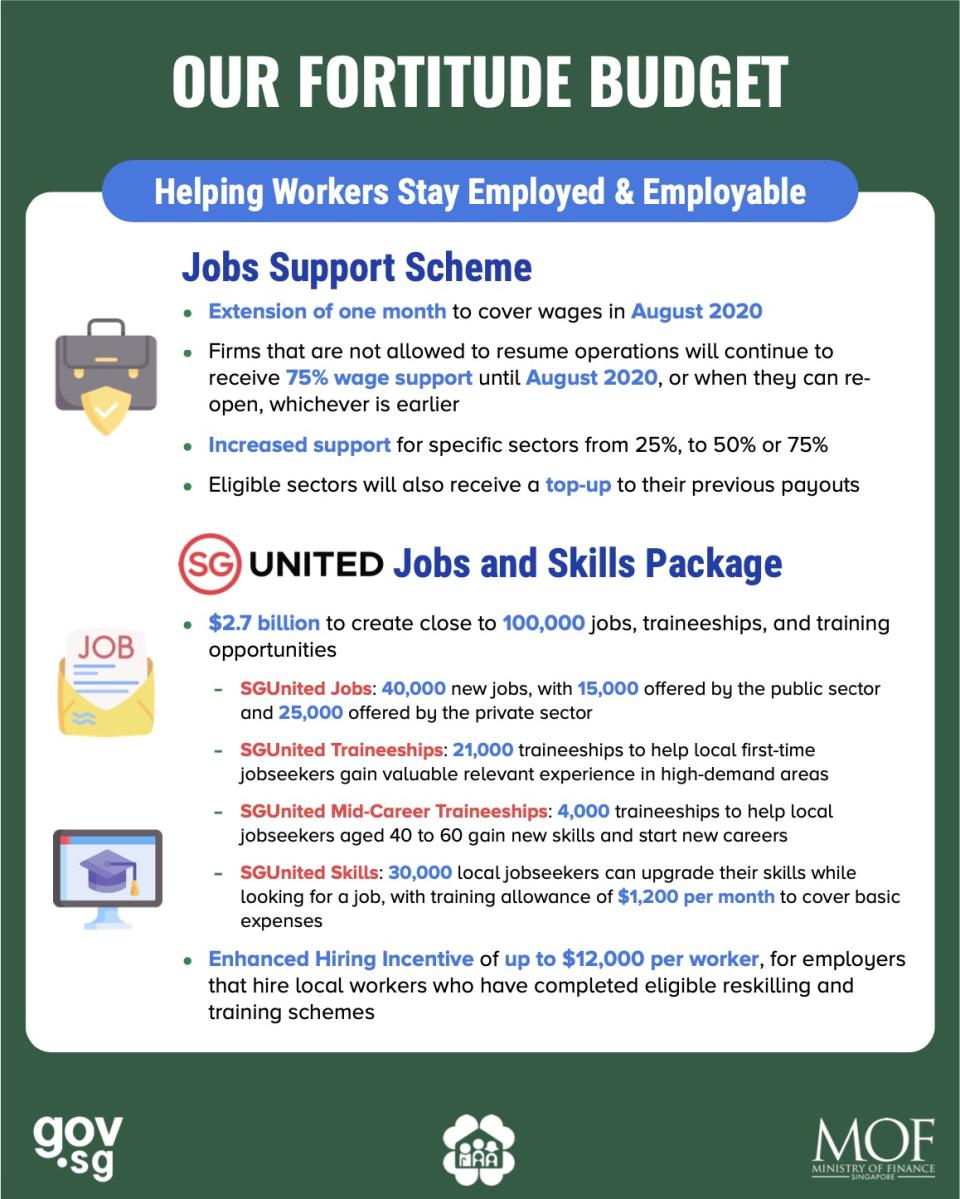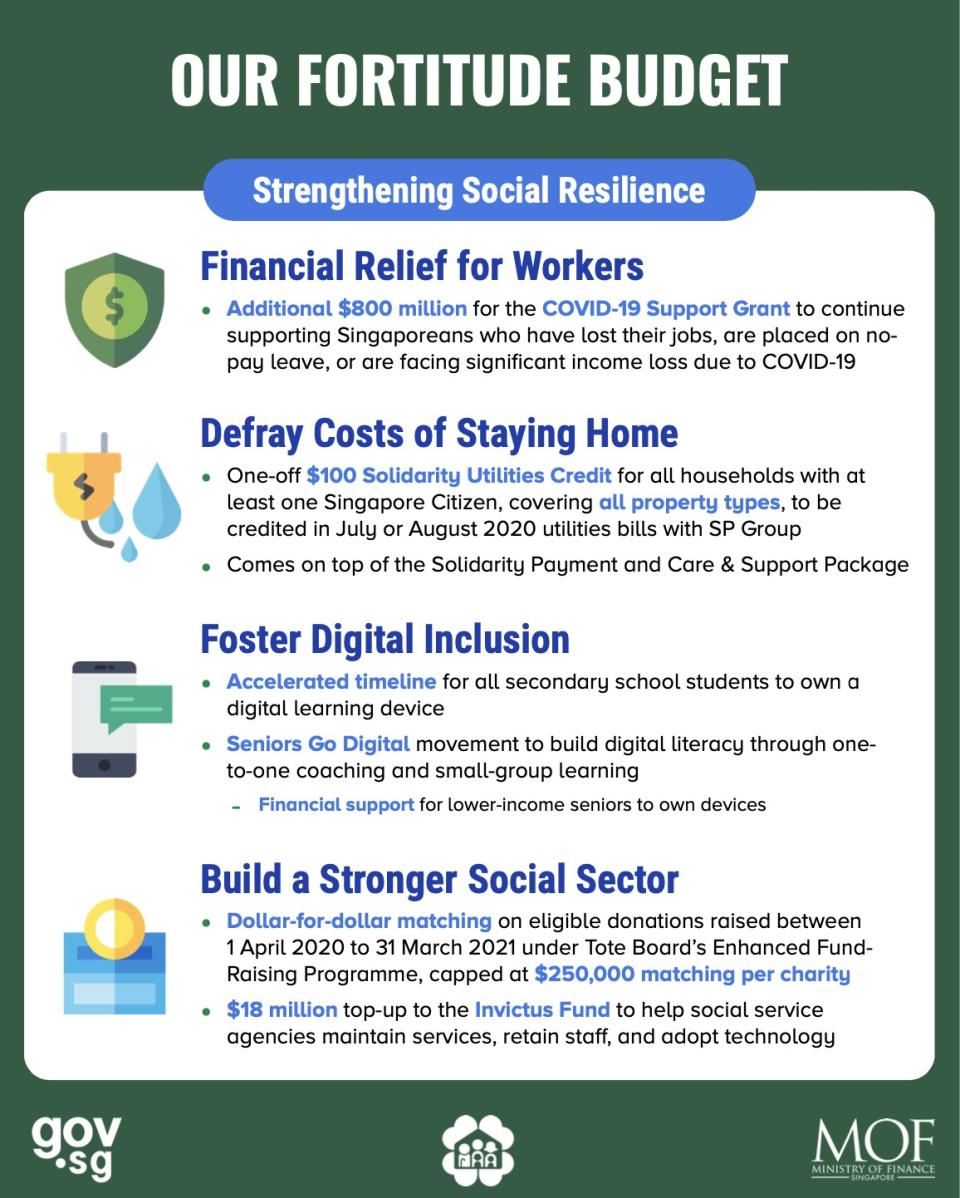Singapore unveils $33 billion 4th Budget as part of COVID-19 response

SINGAPORE — The government will be setting aside another $33 billion in financial support as part of its COVID-19 response, Deputy Prime Minister and Finance Minister Heng Swee Keat announced on Tuesday (26 May).
Dubbed the Fortitude Budget, aimed at helping businesses and saving jobs, the country’s unprecedented fourth Budget for its current financial year brings the total of pandemic-related measures to almost $93 billion.
“The central focus of this Budget is jobs. This Budget will continue to support workers and businesses who remain affected by border closures and safe distancing measures,” said Heng in Parliament.
“Given the significant changes in the global economy ahead, we will provide support to enable our businesses and workers to adapt, transform and seize new opportunities, to emerge stronger.”
Heng added that additional support would also be given to households and the community to help them “cope with the disruptions and seize new opportunities in adversity”.
Funding will also be given to frontline agencies fighting against the pandemic. “This will boost our clinical management of cases, and our swabbing and testing capabilities,” he said.
Heng had earlier unveiled the $6.4 billion Unity Budget in February, the $48 billion Resilience Budget in March, and the $5.1 billion Solidarity Budget in early April.
“Together with the Unity, Resilience and Solidarity Budgets, we are dedicating $92.9 billion or 19.2 per cent of our GDP (gross domestic product), to support our people in this battle,” he said. The new Budget funds will also take Singapore’s overall budget deficit for 2020 to $74.3 billion, or 15.4 per cent of its GDP.
Dipping into past reserves
To fund the Fortitude Budget, the government will be dipping into Singapore’s past reserves for the second time in this financial year. While $21 billion had been drawn for the Resilience and Solidarity Budgets, another $31 billion will be tapped this time around.
On Monday, President Halimah Yacob said in a Facebook post that she had given in-principle approval for the government to draw on the country’s past reserves to fund the latest Budget.
In his speech, Heng also announced that the government would be adding $13 billion to its Contingencies Funds – up from the traditional $3 billion it sets aside annually “as a buffer” for unforeseen needs.
“To meet this unprecedented level of uncertainty, we will set aside a larger sum in the Contingencies Funds, so that we can respond to urgent and unforeseen needs swiftly,” he said.
Earlier on Tuesday, the Ministry of Trade and Industry announced that Singapore’s GDP forecast for 2020 had been downgraded from between -4 per cent and -1 per cent, to between -7 per cent and -4 per cent.

Saving jobs, creating opportunities
To help businesses with their wage costs, the Jobs Support Scheme (JSS) – which helps cover up to 75 per cent of the first $4,600 of a worker’s pay – will be extended by one month for all local firms. The additional month of support will be based on wages paid in August this year and firms will receive the payout in October.
Firms that cannot re-open on 2 June, after the circuit breaker period ends, will receive the full 75 per cent wage support until August, or whenever they can re-open, whichever is earlier.
The scheme will also be enhanced through a refinement of the classification of firms under the different JSS tiers, with the level of wage support being increased for those in sectors that have been more severely impacted. These latest JSS enhancements will cost some $2.9 billion, bringing the total spent on the scheme over a 10-month period to $23.5 billion.
Other steps to help firms with costs include extending the Foreign Worker Levy waiver and rebate for up to two months for businesses that cannot resume immediately after the circuit breaker ends. This will include all firms in the construction, marine and offshore and process sectors, said Heng.
The planned increase in Central Provident Fund (CPF) contribution rates for senior workers will also be deferred by one year to 1 January 2022. The CPF Transition Offset scheme will also be deferred until after the higher contribution rates take effect.

To help businesses with their rental costs, a $2 billion cash grant for small and medium-sized enterprises (SMEs) will be disbursed through property owners. Along with the existing Property Tax Rebate, this will offset about two months of rental for SME tenants in commercial properties and about one more for SMEs in industrial or office properties.
A new Bill to be introduced by the Law Ministry next week will also mandate that landlords contribute to the efforts by granting a rental waiver to their SME tenants who have “suffered a significant revenue drop in the past few months”, said Heng. He added that the government would also lead by example in granting additional rental support for its own tenants.
Under the Fortitude Budget, promising start-ups will be given more support with $285 million being set aside to catalyse and crowd in at least an equal amount in matching private investments for such firms.
While Heng said that most businesses here were expected to re-open by July, he also noted that some sectors – such as aviation and tourism – will take take longer to do the same given the restrictions on global travel for the foreseeable future.
He added that the government would consider providing additional help depending on the “situation and longer-term shape of these industries, and plans for the economy”. “In the interim, I urge businesses to make good use of the existing support and consider how to transform for a post- COVID world,” said Heng.
In terms of job creation, a new $2 billion scheme – called the SGUnited Jobs and Skills Packaged (JSP) – will aim to generate 40,000 jobs, 25,000 traineeships and 30,000 skills training opportunities, for workers with different skill levels and career aspirations.
About 15,000 of these jobs will be in the public sector to meet long-term needs in sectors such as early childhood education, healthcare and long-term care.
Under the SGUnited Skills programme, some 30,000 job seekers will be given the chance to upgrade their skills while looking for work. They will be able to use their SkillsFuture Credit for the courses, which will be held by companies and Continuing Education Training (CET) Centres, including Institutes of Higher Learning.
Apart from being given attachments or participation in company projects, these participants will also be given a training allowance of $1,200 a month during their training.

Funding digital transformations
Another $500 million will be set aside to support local firms’ digital transformations as they adapt to operating during the pandemic.
Noting that some 50,000 more businesses have adopted PayNow Corporate since April this year, Heng said a $300 monthly bonus – given out for five months – will be provided to encourage more stallholders in hawker centres, wet markets, coffeeshops, and industrial canteens to use e-payments and avoid having to handle cash.
A Digital Resilience Bonus will also be introduced to help firms in their digitalisation efforts. Starting with the food and beverage as well as retail sectors, eligible businesses can receive payouts of up to $5,000 if they adopt PayNow Corporate and e-invoicing, along with business process or e-commerce solutions.
An additional $5,000 will also be given to F&B and retail businesses that adopt advanced solutions.
“I will also set aside $250 million to help businesses digitalise in partnership with platform solution providers and industry champions. For example, developing Offline-to-Online business models to access new domestic revenue streams and international demand. This will mitigate the impact of COVID-19 on revenues,” said Heng.

Help for households, charity groups
To help those who have lost their jobs, are placed on no-pay leave or have taken significant pay cuts, $800 million will be added to the COVID-19 Support Grant.
Heng noted that the government has received about 46,000 applications for the grant in the three weeks since it was introduced. “We are committed to providing help to those who have been badly affected,” he added.
To thank all Singaporeans for doing their part in staying home, Heng announced that a one-off $100 Solidarity Utilities Credit will be given to each household with at least one Singapore citizen. This will cover all property types and will be credited in the July or August utilities bill, he said.
With more making use of online resources amid the circuit breaker measures, more digital help will also be given to students and seniors. For students, the Ministry of Education will accelerate the timeline for all secondary school students to own a digital learning device.
Meanwhile, the Infocomm Media Development Authority will also launch a Seniors Go Digital movement to support seniors in adopting digital channels and equipping them with the skills to do so. A Digital Ambassadors movement will also be started to rally volunteers to support seniors in acquiring digital skills.
The government will also be partnering with the Tote Board to enhance the matching for donations through the latter’s Enhanced Fund-Raising Programme.
Charity groups can apply to receive dollar-for-dollar matching on eligible donations raised from projects in the 2020 financial year – up to a cap of $250,000 per charity.
“To enable this, I will provide a top-up of $100 million, to add to the existing $70 million budget for the Enhanced Fund-Raising Programme. I strongly urge Singaporeans and residents in Singapore who are able, to donate generously,” said Heng.
He added that an $18 million top-up to the Invictus Fund would be provided as a means of additional support for social service agencies.
Stay in the know on-the-go: Join Yahoo Singapore's Telegram channel at http://t.me/YahooSingapore
Related links:
COVID-19: New Bill seeks to force landlords to waive rentals for severely impacted SMEs
COVID-19: Extra $2.9b for firms to keep workers employed – Heng Swee Keat
COVID-19: Government to set aside additional $13 billion in Contingencies Funds
COVID-19: $2 billion package to create 100,000 opportunities for workers – Heng Swee Keat
Another $800m for COVID-19 Support Grant: Heng Swee Keat
COVID-19: Additional $3.8b for Solidarity Budget with extended circuit breaker period
COVID-19 Budget: Singapore allocating additional $48 billion to combat ‘unprecedented crisis’



